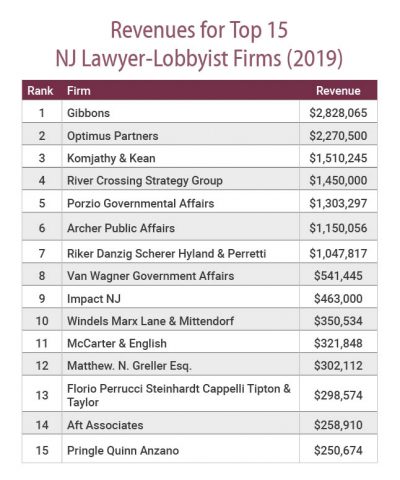NJ Lawyer-Lobbyists Saw Big Payday in 2019, See Uncertainty For 2020
"Regarding the ballot question on marijuana, if we had spoken a month and a half ago, I would have predicted record spending," ELEC executive director Jeff Brindle said. "Now with the pandemic, it will be interesting to watch."
April 10, 2020 at 02:38 PM
14 minute read
 (L-R) Kevin Walsh of Gibbons, David Pascrell of Gibbons, and Mary Kathryn Roberts of Riker Danzig Scherer Hyland & Perretti.
(L-R) Kevin Walsh of Gibbons, David Pascrell of Gibbons, and Mary Kathryn Roberts of Riker Danzig Scherer Hyland & Perretti.
Being heard has never been more expensive in Trenton, or lucrative for lobbyists—the hired guns paid to make sure their clients' interests are represented and amplified at the highest echelons of power at the Statehouse.
Last year's booming economy, an activist governor, one-party rule, and more than 11,000 bills in the Legislature generated a windfall of clients, and made 2019 a banner year for lobbying in the state—with expenditures by clients topping $100 million for the first time ever.
And law firms with lobbying arms staffed by heavy-hitting lawyers, typically those with extensive experience in dealing with or working in government, or lobbying firms made up of lawyers by trade, made out quite well, according to data from the New Jersey Election Law Enforcement Commission. Overall, 28 such firms generated $15.4 million in total receipts. That's up 7% from what the same group earned in 2018. The $15.4 million figure also is the highest total ever for lawyer-lobbying firms, according to ELEC, which regulates the industry.
 Of the top lawyer-lobbying firms in New Jersey, seven grossed $1 million or more in 2019: Gibbons, at $2.83 million; Optimus Partners, with $2.27 million; Komjathy & Kean, $1.51 million; River Crossing Strategy Group, $1.45 million; Porzio Governmental Affairs, $1.3 million; Archer Public Affairs, $1.15 million; and Riker Danzig Scherer Hyland & Perretti, $1.05 million.
Of the top lawyer-lobbying firms in New Jersey, seven grossed $1 million or more in 2019: Gibbons, at $2.83 million; Optimus Partners, with $2.27 million; Komjathy & Kean, $1.51 million; River Crossing Strategy Group, $1.45 million; Porzio Governmental Affairs, $1.3 million; Archer Public Affairs, $1.15 million; and Riker Danzig Scherer Hyland & Perretti, $1.05 million.
Some say the increase in receipts was largely due to the addition of new clients with an interest in a range of issues, including health care, insurance, renewable energy and internet gaming space. And with Democrats in full control of the government, issues that had not seen consideration in the prior Republican administration of Gov. Chris Christie suddenly moved to the top of the agenda.
Marijuana interests also came out in full force since legalization of adult recreational use, with an added focus on social reforms, emerged as a key initiative by Gov. Phil Murphy. Although the massive New Jersey Cannabis Regulatory and Expungement Aid Modernization Act ultimately failed to clear the Senate, it is expected to generate as much—if not more—lobbying attention this fall, when it is to be decided by voter referendum.
Gibbons of Newark led the lawyer-lobbyist pack for the 12th consecutive year with its Trenton-based government and regulatory affairs department, co-chaired by David Pascrell and Kevin Walsh. The department's $2.8 million in 2019 receipts represented a 16% increase from 2018, and placed Gibbons sixth overall among all lobbying firms in the state.
"The reason why Gibbons is so far ahead of the curve is that we have had an established regulatory and government affairs group for nearly two decades," said Pascrell, who's been with Gibbons since 2002, and whose father is longtime U.S. Rep. William Pascrell, D-New Jersey. "We have been doing this longer than other firms. It puts us in a unique position. No one can marry the intersection of law and government as good."
Many are trying, it seems. There were 945 registered lobbyists in New Jersey in 2019, up from 900 in 2017, and the number of clients rose to the largest total ever at 2,222, representing a 16% increase, according to ELEC reports.
"There was a lot of pent-up demand on progressive legislation while former Gov. Christie served two terms," Pascrell said. In addition, "Gov. Murphy has a serious agenda that he would like to get done in areas like health care, [poverty], the environment, and energy, and he wants to execute on those items, and have a very prolific legislative legacy."
Senate President Steve Sweeney and Assembly Speaker Craig Coughlin "always have an aggressive agenda, and they don't always match up [with Murphy], which often produced competing legislative priorities with the governor and more legislative activity," Pascrell added.
One such bill that created a lot of controversy was sponsored by Sweeney, D-Gloucester, that sought to address classification of independent contractors and employees. A-5936/S-4204 never made it out of either chamber in the last session. In this new session, which started on Jan. 14, the Senate bill was introduced as S-863, while an Assembly counterpart has not yet been introduced.
That legislation was just one example of the thousands that Gibbons tracked, according to Pascrell.
Experience also paid off for Morristown-based Riker Danzig, which finished seventh among lawyer-lobbying firms in receipts at $1.05 million, up from $982,724 the previous year.
"Riker Danzig has had one of the longest-standing government affairs practices in Trenton," said partner Mary Kay Roberts. "Most of our clients have been with the firm for decades."
Riker Danzig also attracted new ones from the health care and insurance fields, which helped drive revenue.
"In the 2018-2019 legislative session, we saw a record number of legislative introductions of close to 11,500 bills, and our clients are keenly aware of the need for representation in New Jersey," Roberts said.
River Crossing's top clients last year were in renewable energy—everything from solar to offshore wind to electric vehicles. Murphy making alternative energy a key issue didn't hurt. Marijuana was another area of heavy focus, as was education and real estate, said co-founder Eric Shuffler. The uptick propelled River Crossing to a fourth-place finish among lawyer-lobby firms, with $1.45 million in revenue.
"I am a lawyer, did pass the New Jersey bar, but I have never practiced nor do I practice now, but the legal education and training has been exceptionally helpful in my work and my efforts both inside of government and as a lobbyist," said Shuffler, who previously worked on Capitol Hill as chief of staff to then-U.S. Sen. Robert Torricelli, D-New Jersey, while attending Catholic University's law school at night.
Receipts at Porzio Governmental Affairs totaled $1.3 million last year, up from $1.18 million in 2018, an increase of 10%. It gave Porzio a fifth-place finish among lawyer-lobbying firms.
"It was a good year," said Vito Gagliardi, managing partner of Porzio, Bromberg & Newman in Morristown and president of the firm's 10-year-old lobbying subsidiary, Porzio Governmental Affairs, based in Trenton. "It was an active year in the Legislature, and we had more activity from long-standing clients. But the key to our success is that it complements our law firm."
Among Porzio's newer clients last year were: Vote.org, which was very involved in the issue of online voter registration; Girls Who Code, which addresses gender inequality in the technology field; and Continent 8 Technologies, which partnered with the Casino Reinvestment Development Authority to open a new data center in Atlantic City last June. The center houses technology infrastructure for internet gaming and sports wagering, and is located at the Atlantic City Convention Center.
Minding the Details
Language in a bill coursing its way through the Legislature—even an obscure, seemingly overlooked sentence—can impact a client's bottom line substantially. That's where lawyer-lobbyists can come in and fight either for or against the measure, or seek to have it amended or stalled through influence with lawmakers.
At Gibbons' Trenton office, lawyers monitor legislation down to the minute details, the group says.
Walsh, a former assistant U.S. attorney in the Criminal Division in Newark, describes the department as "a profit center" for Gibbons that "serves to drive business for other departments in the firm."
So much so that Gibbons opened an office in Washington, D.C., in January 2019 staffed by William Palatucci, the Republican National Committee's committeeman for New Jersey, and Jason Redd, former deputy executive director and general counsel to the New Jersey Senate Majority Office, senior counselor to the Senate president and chief of staff to the Senate majority leader.
"We have not just former Assembly and Senate staffers, but from all over state government," Walsh said. "And we can pull in from all levels. It's a real luxury for us."
Two of Porzio's three registered lobbyists are women, including Barbara DeMarco, vice president of Porzio Governmental Affairs.
 Barbara DeMarco
Barbara DeMarcoLast year DeMarco focused on legislation that impacted the cost of doing business in New Jersey, all education-related legislation and regulation (both K-12 and higher education), state budget concerns, and issues rooted in constitutional rights and freedoms, according to the firm.
While she's not an attorney, DeMarco said having Porzio's deep legal bench was a tremendous help.
"I have the former head of the Secret Service in New Jersey, a former assistant commissioner of the Department of Human Services, the former commissioner of education, a director of knowledge [Harvard graduate in charge of technology systems], the first African American New Jersey Supreme Court justice [James Coleman], among others to tap," DeMarco said. "These individuals are spread across the [firm's] other three companies. If they do not have an answer, they know where and how to get it."
The Big Spenders
The $100 million in total lobbying expenditures last year represented the biggest one-year increase since 2015, jumping nearly $8.4 million, or 9.1%, according to ELEC.
The surge in lobbying activity occurred as the three top-spending groups—the New Jersey Education Association, New Direction NJ Corp. and Horizon Blue Cross-Blue Shield of New Jersey—collectively spent $10.2 million more in 2019 than they did a year earlier.
The three groups were behind a heavy surge in communications spending ($13.6 million) to get their message out, as their hired lobbyists relied more frequently on the airwaves and internet to build pressure for or against a measure—known as issue advocacy advertising.
"A good economy encouraged development of legislative initiatives that otherwise would not have been considered," said Dale Florio, head of Princeton Public Affairs, the state's top-grossing lobbying firm, raking in $10.6 million last year. "The Murphy administration has indicated it is willing to spend money on initiatives it deems important, and that breeds new opportunities for clients who want to see if they can advance their interests.
"The flip side of that is some businesses and industries felt threatened by potential tax increases and different policies," added Florio, a nonpracticing attorney. "There's a whole genre of interest that want to use advocates for defensive purposes—such as natural gas pipelines."
Perhaps the most vocal was the New Jersey Education Association, the state's oldest registered lobbying group that represents about 200,000 teachers and other school workers. There was a more than elevenfold increase in the NJEA's lobbying spending in 2019, jumping to $6.24 million, its largest expenditure since 2015.
NJEA had 15 registered lobbyists, all in-house, who tracked approximately 350 different bills during the last legislative session. Not by coincidence, the NJEA and Sweeney announced earlier this year that they had reached an agreement on health benefits, arbitration and sick leave.
"That was an important thing for the NJEA," ELEC Executive Director Jeff Brindle said. "That was one of the things they were lobbying on."
No. 2 in special interest lobbying spend was New Direction NJ, a 501(c)(4) social welfare group created in November 2017 by Murphy's former campaign manager Brendan Gill that ran a series of issue advertisements touting Murphy's policies. New Direction NJ ramped up its lobbying spending from the previous year by 676%, to $3.9 million, according to ELEC.
ELEC reports filed by Horizon Blue Cross Blue Shield-New Jersey showed it had the third-largest increase in spending, at $1.43 million. Part of Horizon's funds went toward Move Health Care Forward NJ Inc., which spent $849,866 on an advertising campaign seeking support for a bill that would let the state's largest health insurer modernize its corporate structure.
Thomas Vincz, a Horizon spokesman, said the money was well spent.
"To continue meeting the needs of our members, Horizon began pursuing legislation last year that would allow the company to become a not-for-profit mutual … that would allow us to be more flexible and responsive in the face of the enormous changes occurring in health care today," Vincz said. "The increased spending reflects the work that Horizon is doing to help ensure that policymakers, stakeholders and the public understand the legislation, and why it is critical to the future of health care in New Jersey."
Groups who wanted a piece of the potentially multibillion-dollar marijuana industry opening up also came out in force and spent big. ELEC listed 68 marijuana interests—with such names as Acreage Holdings, Beyond Green, and Compassionate Care Centers of America Foundation/Garden State Dispensary—that spent $1.9 million to get heard in Trenton.
Cannabis was a big revenue driver at Porzio. "It's an area where the law is developing so quickly," said Gagliardi. "Clients come to us for both legal and lobby work. We can do both."
"For us, it's the fact the lobbying and legal work is so complementary," Gagliardi added. "It attracts clients and we advocate for them in two areas: in the part of government where they make the laws, and the part of government where they interrupt the laws, mainly the courts."
With the marijuana bill failing to garner enough Senate support in May 2019, lawmakers decided to ask voters to decide the issue this fall as a November ballot question.
But no one fully anticipated the impact of the novel coronavirus pandemic. New Jersey has been under a public health state of emergency since March 9—the same day the 2019 ELEC figures came out.
Navigating a Pandemic
It seems lobbyists may have to rethink how they practice their craft. Earlier this month, Murphy extended the state's emergency declaration up to 30 days to continue social distancing measures he's put into place to slow the spread of the potentially deadly virus. Traditional face-to-face lobbying in the Statehouse with lawmakers will be difficult, it appears.
The Legislature nevertheless has been busy. To address the COVID-19 fallout, lawmakers acted swiftly. With the public barred from the Statehouse due to health and safety concerns, the Assembly and Senate passed a coronavirus emergency package of 28 bills in mid-March to aid residents, businesses, schools, hospitals, food banks, and others impacted by the pandemic.
The Senate plans to vote on an additional 23 bills and two resolutions on April 13.
"There's really no baseline to judge what this year will bring," Brindle said.
"Regarding the ballot question on marijuana, if we had spoken a month and a half ago, I would have predicted record spending for marijuana. Now with the pandemic, it will be interesting to watch. The question is, 'If business is impacted and profits are down, what is going to be the level of contributions to pro- and anti-marijuana efforts to defeat or pass the ballot question?'
"If things straighten up real quickly, $10 million could be spent on the ballot question alone. But what if it's all by mail-in voting because people can't go to the polls? They can't go out period. We just don't know at this point," he added.
But events suggest there will be a lot of lobbying going on in the coming months, especially since the leaders of the Legislature and Murphy just announced that the legislative calendar would be extended from June 30 to Sept. 30 to give the state sufficient time to reach a balanced budget and get recovery efforts underway.
DeMarco of Porzio Government Affairs said, "During a pandemic, when new laws, executive orders, administrative orders, emergency rules and regulations and guidance memorandums are coming in quickly from the governor's office and each department and authority/commission in the state, your clients want answers as to, 'What does this mean?' immediately.
"Having a lawyer or professional in security or education or disability law or pharmaceuticals to interpret it for you from a legal perspective, tells the lobbyist if it is good enough or expansive enough to protect the client," she said.
"Again, invaluable."
This content has been archived. It is available through our partners, LexisNexis® and Bloomberg Law.
To view this content, please continue to their sites.
Not a Lexis Subscriber?
Subscribe Now
Not a Bloomberg Law Subscriber?
Subscribe Now
NOT FOR REPRINT
© 2025 ALM Global, LLC, All Rights Reserved. Request academic re-use from www.copyright.com. All other uses, submit a request to [email protected]. For more information visit Asset & Logo Licensing.
You Might Like
View All

NJ Attorney General Seeks Special Counsel for Data Privacy, Cybersecurity and AI Matters
2 minute read
Lawyer-Lobbyist Receipts Continue to Surge Even as Overall Spending Decreased
7 minute read
Law Firms Mentioned
Trending Stories
- 1Supreme Court Takes Up Challenge to ACA Task Force
- 2'Tragedy of Unspeakable Proportions:' Could Edison, DWP, Face Lawsuits Over LA Wildfires?
- 3Meta Pulls Plug on DEI Programs
- 4On the Move and After Hours: Meyner and Landis; Cooper Levenson; Ogletree Deakins; Saiber
- 5State Budget Proposal Includes More Money for Courts—for Now
Who Got The Work
Michael G. Bongiorno, Andrew Scott Dulberg and Elizabeth E. Driscoll from Wilmer Cutler Pickering Hale and Dorr have stepped in to represent Symbotic Inc., an A.I.-enabled technology platform that focuses on increasing supply chain efficiency, and other defendants in a pending shareholder derivative lawsuit. The case, filed Oct. 2 in Massachusetts District Court by the Brown Law Firm on behalf of Stephen Austen, accuses certain officers and directors of misleading investors in regard to Symbotic's potential for margin growth by failing to disclose that the company was not equipped to timely deploy its systems or manage expenses through project delays. The case, assigned to U.S. District Judge Nathaniel M. Gorton, is 1:24-cv-12522, Austen v. Cohen et al.
Who Got The Work
Edmund Polubinski and Marie Killmond of Davis Polk & Wardwell have entered appearances for data platform software development company MongoDB and other defendants in a pending shareholder derivative lawsuit. The action, filed Oct. 7 in New York Southern District Court by the Brown Law Firm, accuses the company's directors and/or officers of falsely expressing confidence in the company’s restructuring of its sales incentive plan and downplaying the severity of decreases in its upfront commitments. The case is 1:24-cv-07594, Roy v. Ittycheria et al.
Who Got The Work
Amy O. Bruchs and Kurt F. Ellison of Michael Best & Friedrich have entered appearances for Epic Systems Corp. in a pending employment discrimination lawsuit. The suit was filed Sept. 7 in Wisconsin Western District Court by Levine Eisberner LLC and Siri & Glimstad on behalf of a project manager who claims that he was wrongfully terminated after applying for a religious exemption to the defendant's COVID-19 vaccine mandate. The case, assigned to U.S. Magistrate Judge Anita Marie Boor, is 3:24-cv-00630, Secker, Nathan v. Epic Systems Corporation.
Who Got The Work
David X. Sullivan, Thomas J. Finn and Gregory A. Hall from McCarter & English have entered appearances for Sunrun Installation Services in a pending civil rights lawsuit. The complaint was filed Sept. 4 in Connecticut District Court by attorney Robert M. Berke on behalf of former employee George Edward Steins, who was arrested and charged with employing an unregistered home improvement salesperson. The complaint alleges that had Sunrun informed the Connecticut Department of Consumer Protection that the plaintiff's employment had ended in 2017 and that he no longer held Sunrun's home improvement contractor license, he would not have been hit with charges, which were dismissed in May 2024. The case, assigned to U.S. District Judge Jeffrey A. Meyer, is 3:24-cv-01423, Steins v. Sunrun, Inc. et al.
Who Got The Work
Greenberg Traurig shareholder Joshua L. Raskin has entered an appearance for boohoo.com UK Ltd. in a pending patent infringement lawsuit. The suit, filed Sept. 3 in Texas Eastern District Court by Rozier Hardt McDonough on behalf of Alto Dynamics, asserts five patents related to an online shopping platform. The case, assigned to U.S. District Judge Rodney Gilstrap, is 2:24-cv-00719, Alto Dynamics, LLC v. boohoo.com UK Limited.
Featured Firms
Law Offices of Gary Martin Hays & Associates, P.C.
(470) 294-1674
Law Offices of Mark E. Salomone
(857) 444-6468
Smith & Hassler
(713) 739-1250






